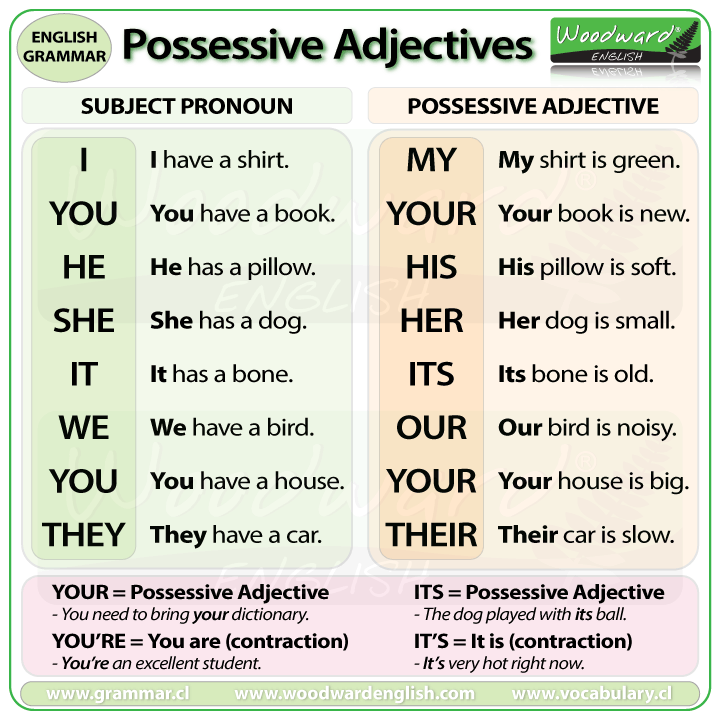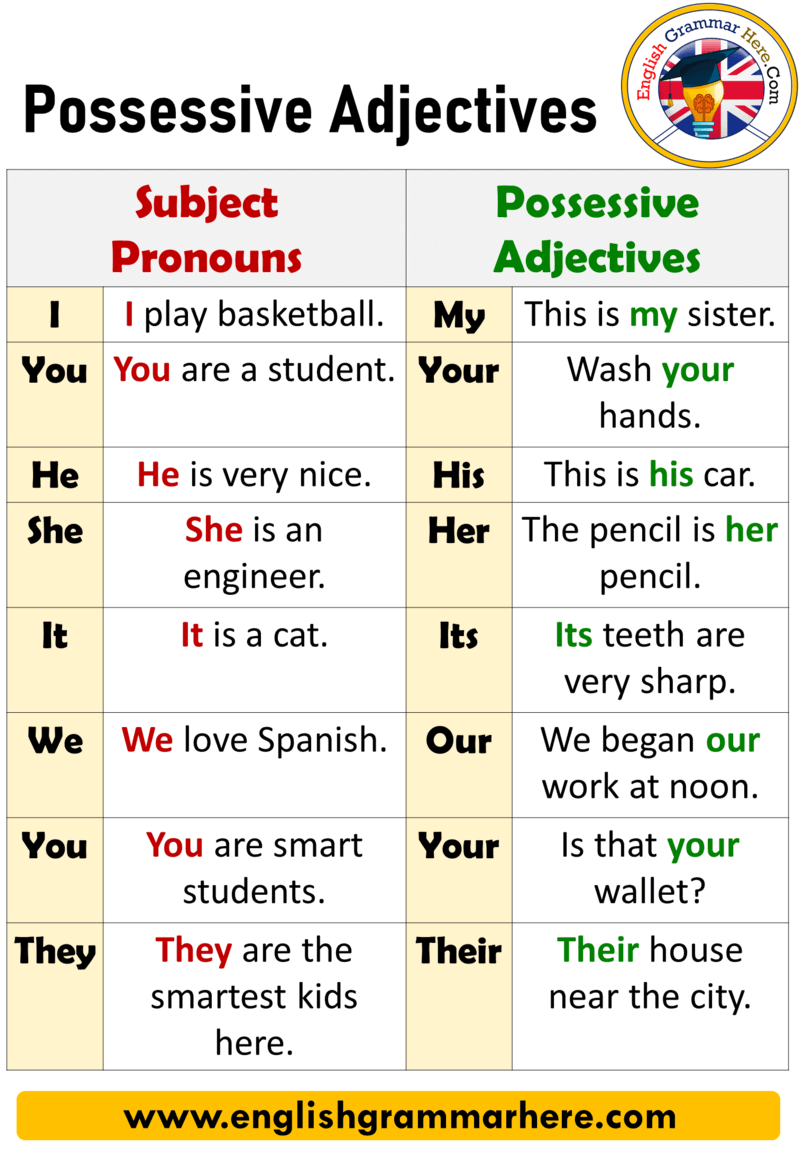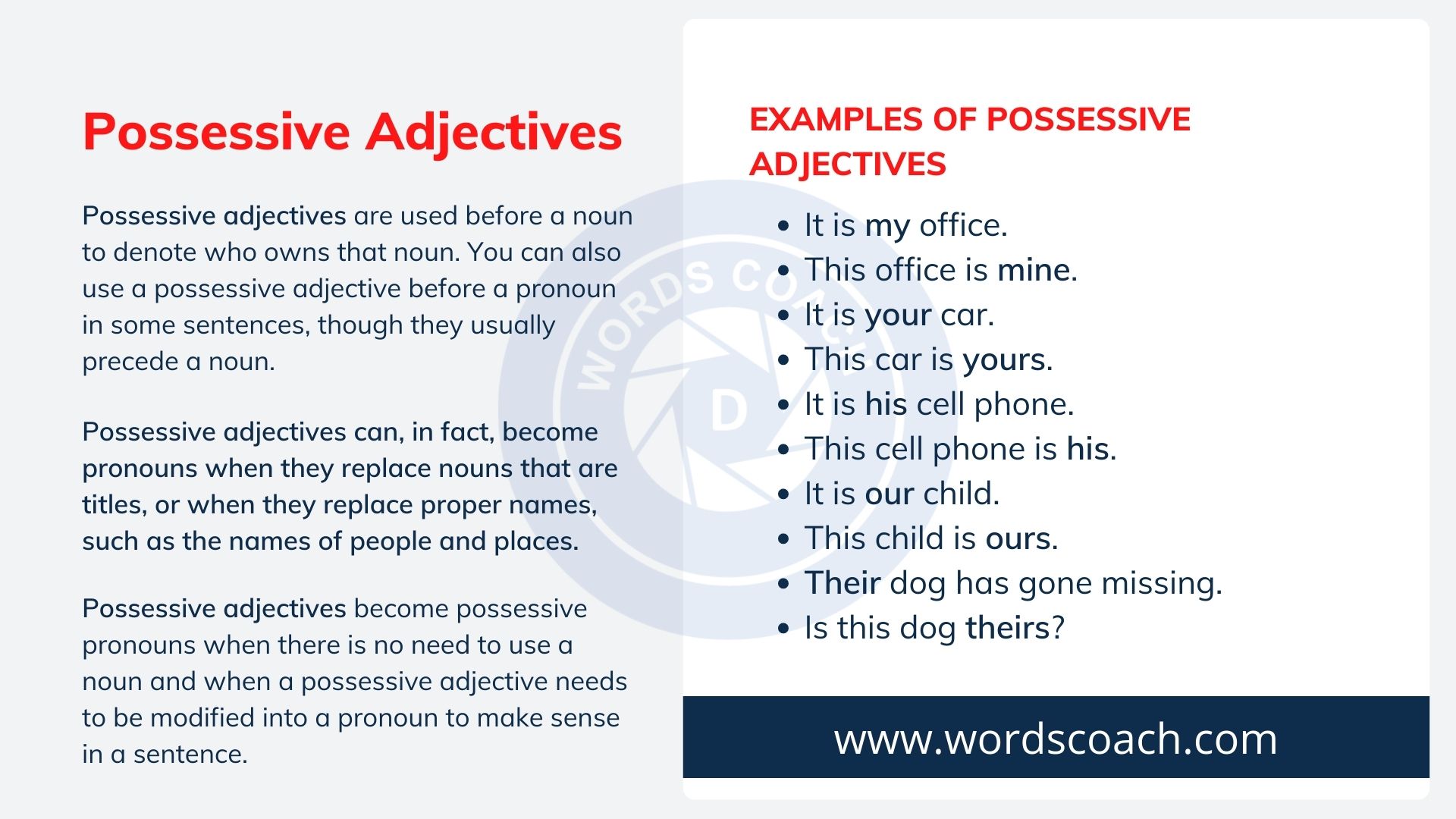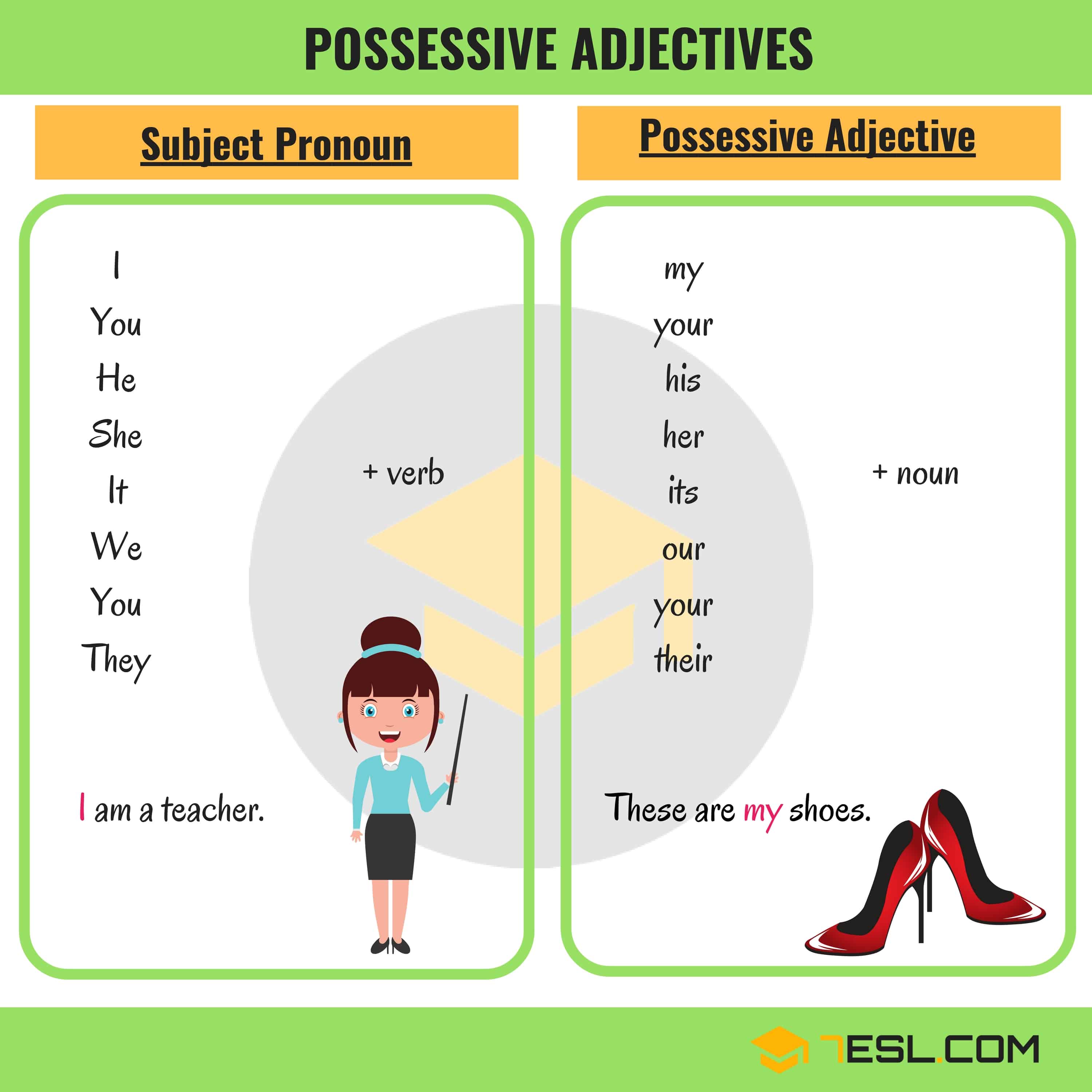
Personal & possessive pronouns and possessive adjectives
Possessive adjectives are words like my, your, his. They are used before nouns. Possessive pronouns are words like mine, yours, his. They are used alone. Forms, sentence examples, rhymes. PDF resources Our printables are in pdf format. You need Adobe Acrobat Reader to view, download and print these resources. Learn more » Terms of use

ESL VIDEO Possessive Adjectives in English Grammar Lesson (mit Bildern) Adjektive englisch
A possessive adjective, according to the Collins Dictionary, is "an adjective such as 'my' or 'your' which shows who or what something belongs to or is connected with". According to the Merriam-Webster Dictionary, a possessive adjective is "a pronominal adjective expressing possession". Examples of Possessive Adjectives

Teacher María José
Possessive Adjectives in Spanish Posters and Word Wall - Adjetivos de Posesion $ 4.50 Add to cart SKU: 5290955 Categories: Classroom Decor, Middle School Resources, Verb to be and Grammar Tags: 1st, 2nd, 3rd, 4th, 5th, 6th, 7th, 8th, Bulletin Board Ideas, Posters, Spanish, Word Walls, Zip Description Preview Description

Possessive Adjectives, Definition and Example Sentences English Grammar Here
A possessive adjective is a word that modifies a noun or pronoun to show possession or a relationship. This guide is part of our free online Grammar Book. Table of Contents What Are Possessive Adjectives? Why We Use Possessive Adjectives To Show a Relationship To Show Ownership For Things That Happen to Us How to Use Possessive Adjectives

Possessive Adjectives Definition & Usage Useful Examples Word Coach
260 + results Sort by: Relevance View: List Possessive Adjectives in Spanish Posters and Word Wall - Adjetivos de Posesion Created by Mrs Cabello Spanish Class Visual aids are a MUST for my classroom. Possessive adjectives are crucial when we review our family unit. These visuals will help your students to stay in the target language.

Understand English Possessives English Outside The Box
Browse possessives posters resources on Teachers Pay Teachers, a marketplace trusted by millions of teachers for original educational resources.

Possessive adjectives online presentation
1. Possessives. Possessives are mainly used to indicate that something belongs to or is part of someone. We also use them to express relationships (people or animals) and to talk about parts of the body. They go according to the possessor, not to the possession. Possessive pronoun. I have a pet, so this pet is mine.

Possessive Adjectives Genlish
Possessive Adjectives (my, your, his, her, its, our, their) and Demonstrative Words (this, that, these, those) Discover the Grammar Read the information about Tim Wilson's family, and then answer the eight questions. Line 1 I'm Tom. My name is Thomas, but everyone calls me Tom. 2 I'd like to introduce you to my family. 3 This my wife.

Possessive adjectives English ESL worksheets pdf & doc
English possessive adjectives go before the noun they describe, and if there are any other adjectives in the phrase, they go before them as well: Possessive adjectives are used instead of the article the, so you can use either a possessive adjective or the, but not both. That's unlike how we use them in Portuguese—but in English you can't say.

Possessive Adjectives Definition and Usage Useful Examples English Study Online
English Grammar Possessives Possessives: adjectives Possessives: adjectives Level: beginner We use possessive adjectives: to show something belongs to somebody: That's our house. My car is very old. for relations and friends: My mother is a doctor. How old is your sister? for parts of the body: He's broken his arm. She's washing her hair.

POSSESSIVE ADJECTIVES 7 E S L
Lesson C possessive adjectives (1) | English File | Oxford University Press. > English File > Elementary third edition > Grammar Lesson C possessive adjectives (1) Grammar. Vocabulary.

Possessive adjectives pdf y ejercicio online
Video Lesson Why Possessive Adjectives Are Important Test Time! Possessive Adjectives or Possessive Determiners? NB: Since the 1960s, possessive adjectives have also been known as "possessive determiners." Both terms are still in common use. "Possessive adjective" is currently about twice as popular as "possessive determiner."

BASIC ENGLISH I Possessive Adjectives
Posters included in this bundle: 1. possessive adjectives 2. possessive pronouns 3. subject and object personal pronouns 4. One big poster including all above! ************************************************************************ All posters are HIGH RESOLUTION, suitable for classroom POSTERS! Thank you for stopping by!

Possessive adjectives interactive and downloadable worksheet. You can do the exercises online or
FREE POSTER - Possessive Pronouns ; Adjectives and more POSTERS BUNDLE. Created by . London Calling Designs. Posters included in this bundle: 1. possessive adjectives 2. possessive pronouns 3. subject and object personal pronouns 4. One big poster including all above! ***** All posters are HIGH RESOLUTION, suitable for classroom POSTERS!

Possessive Adjectives 2 in 2021 Possessive adjectives, Adjectives, Possessive pronoun
Explore more than 108 "Possessive Adjectives" resources for teachers, parents and pupils as well as related resources on "Possessive Pronouns". Help. Instantly access Twinkl's printable and digital K-12 teaching resources, including worksheets, eBooks, games, PowerPoints, Google Slides, and more!

8 Possessive Adjectives, Definition and Example Sentences Possessive adjectives, Adjectives
A possessive adjective is an adjective that modifies a noun by identifying who has ownership or possession of it. For example, in the sentence Andrew lost his keys the word his is a possessive adjective that indicates the keys belong to Andrew. The most commonly used possessive adjectives are my, your, his, her, its, our, their, and whose.